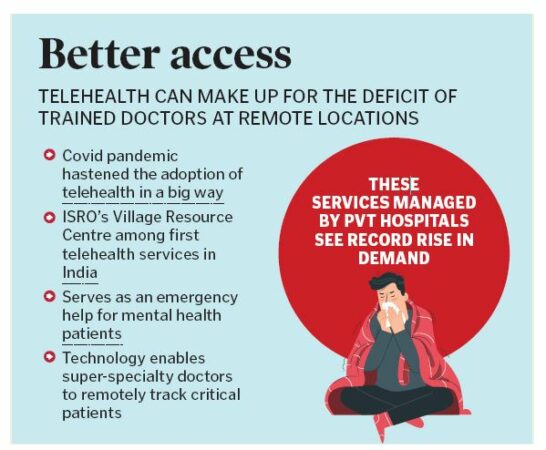Posted: Wed 10/26/22 11:51pm Updated

The technology that provides healthcare services doesn’t have to be complex and high-tech always. In many cases, simple technology has gone a long way in changing the shape of the country’s healthcare delivery mechanism.
A simple and effective technology that has recently gained a foothold among patients and doctors alike in India is telehealth services. The first telemedicine service in India was launched around 2001-02. For a long time, however, telemedicine has been on the fringes not only in Telangana but also across the country, as patients and doctors alike steadfastly avoided its use.
While the idea of patients meeting doctors remotely is promising, telehealth services never really took off in India, as patients and caregivers prefer physical consultations in hospitals.
However, the Covid pandemic changed that perception once and for all. Due to the threat of nosocomial infections during the pandemic, telemedicine has been rapidly adopted in large numbers by patients and doctors. In just two years, telehealth has become an accepted way for patients to seek care. For its part, the Telangana government has also launched unique services for patients using telehealth facilities.
HITAM Initiative in Telangana
The Home Isolation, Treatment and Monitoring Protocol (HITAM) introduced by the Telangana government during the Covid-19 pandemic has not only been well received by patients but also appreciated by NITI Aayog in its report “Home-Based Covid-19 Management” praised and documented the initiative.
The HITAM strategy includes rapid identification of Covid-positive patients and assessment of those requiring home isolation. Phone callers are trained to identify severe Covid cases so they can be referred to senior doctors and hospitalized. Callers are informed of emergency ambulances and Covid-19 hospitals for fast transport and admission.
During the peak of the Covid-19 pandemic, the Telangana government operated a dedicated telehealth call centre to provide consultation and care guidance to patients. Patients are provided with facilities such as telemedicine consultations, distress management through 24×7 incoming calls, and emergency management through 108 connection and transfer facilities. The inbound call center has 20 seats, can answer 1,500-2,000 calls per day, and operates two shifts. The telehealth call center takes nearly 1,000 calls a day and provides information to about 10,000 home-isolated COVID-19 patients.

Mental Health Call Center
Most recently, the state government, in partnership with the Union Health Ministry, launched a unique remote mental health support for individuals seeking help and guidance. A tele-mental health call center of 25 psychologists and three psychiatrists is providing tele-consultation for desperate and suicidal people experiencing mental breakdowns.
The free mental health call centre will work closely with senior psychiatrists at the Elagada Institute of Mental Health (IMH) to provide callers with inpatient facilities at government mental health centres when needed.
Teledialysis in Telangana
In another unique initiative, the state government established a teledialysis facility. It recently instructed NIMS to start the facility. The teledialysis facility enables senior nephrologists from NIMS, Gandhi Hospital and OGH to remotely provide OPD consultations to kidney patients receiving free dialysis. The teledialysis facility will also enable nephrologists to remotely track the health of high-risk kidney patients, thereby reducing hospitalizations.
